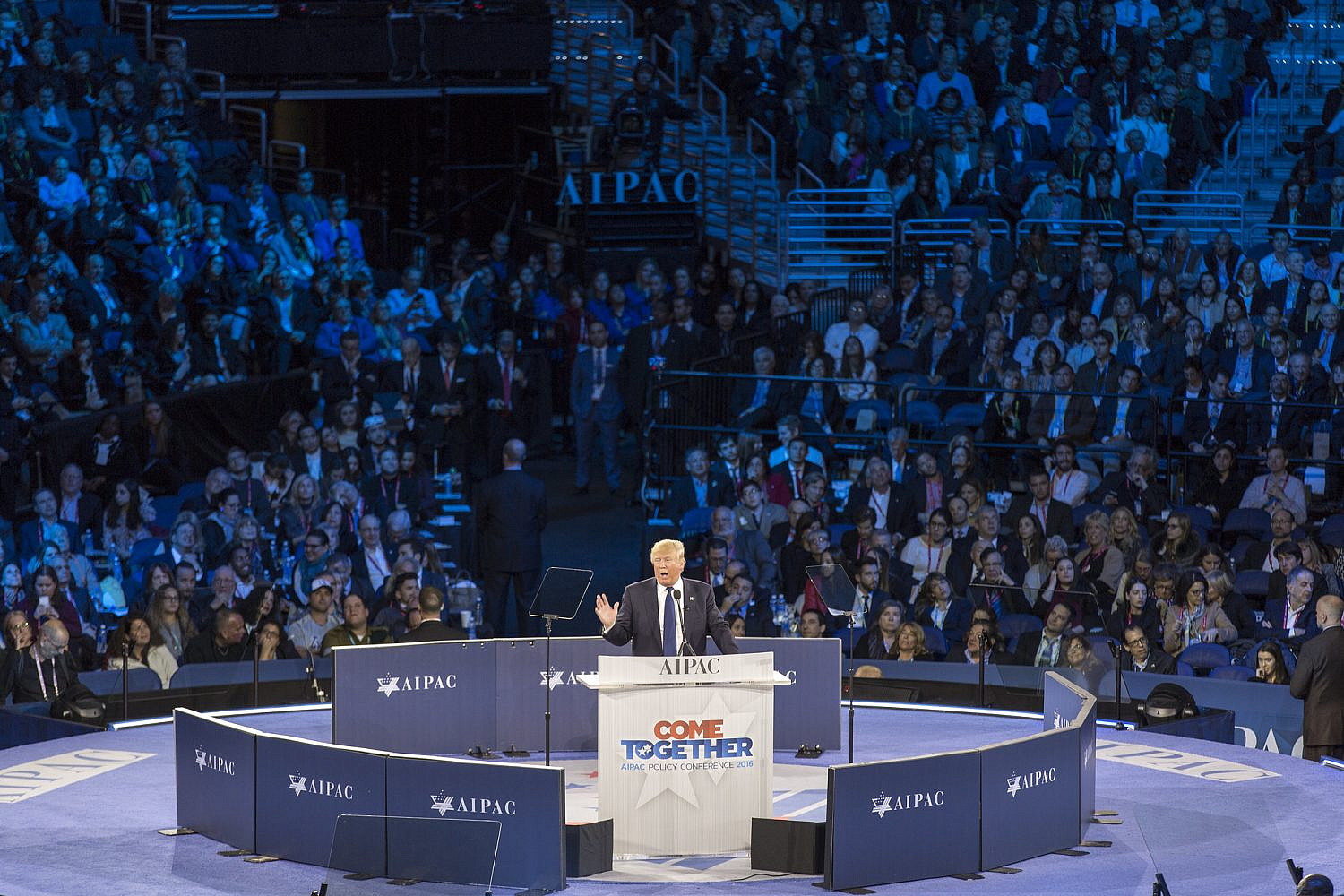The American Israel Public Affairs Committee (AIPAC) has long prided itself on being a “single issue” organization. Now, however, it is making it clear to what extent it will go to advance that issue: by dismissing violent antisemitism, racism, and even the promotion of the overthrow of the U.S. government, so long as they are packaged alongside unconditional support of Israeli policies.
In early March, AIPAC PAC — the political action committee created by the hawkish lobbying group, which allows it to endorse candidates for political office for the first time in the organization’s history — announced its first list of endorsements. As expected, the list was bipartisan, reflecting AIPAC’s long-held commitment to ensuring that both sides of the aisle continue backing Israel’s policy preferences.
But while the Democrats on the list were largely unsurprising, 37 of the Republican endorsees starkly stood out: in addition to having a long record of support for hawkish Israeli and anti-Palestinian policies, these representatives had refused to certify the 2020 election victory of Joe Biden over Donald Trump. Two of them — Reps. Jim Jordan of Ohio and Scott Perry of Pennsylvania — even refused to testify before the congressional panel investigating the insurrection of Jan. 6, 2020, when Trump supporters stormed the U.S. Capitol in an attempt to reverse the election results.
The decision to back these Republicans prompted a sharp backlash from both expected and unexpected corners. And in the face of that response, AIPAC has only doubled down.
J Street, the self-styled “pro-Israel, pro-peace” lobbying group that tries to position itself as a counter to AIPAC, condemned the move, as did the Jewish Democratic Council of America. The more right-wing Democratic Majority for Israel also criticized AIPAC. While these groups regularly oppose the Republican agenda, criticism of AIPAC’s decision also came from much closer to home, including former AIPAC officials and several prominent anti-Trump right-wing figures, like Washington Post columnist Jennifer Rubin and pundit Norman Ornstein of the conservative American Enterprise Institute (AEI).
AIPAC, however, has continued to dig in its heels. “Unlike other groups which have ideological and partisan agendas, we are a single-issue organization that is focused on our mission of building bipartisan support in Congress to strengthen the U.S.-Israel relationship,” said AIPAC spokesman Marshall Wittmann.
In a letter to supporters, AIPAC President Betsy Korn and CEO Howard Kohr wrote: “We have friends who are pro-choice and pro-life, those who are liberal on immigration and those who want to tighten our borders — and yes, those who disagree strongly on issues surrounding the 2020 presidential election. These disagreements are not minor. They are, in many respects, critical to the future of America. But they do not determine the fate of America’s enduring commitment to the State of Israel.”
With these words, the AIPAC leadership effectively reduced an event seen by many as an attempted coup d’etat to a mere policy dispute. As J Street’s senior vice president Dylan Williams tweeted in response, “This letter seems to suggest that there’s no line the American pro-Israel community shouldn’t cross, even if that means selling out America’s democratic future and supporting those who threaten minorities here at home.”
AIPAC’s explanation has the same clear corollary: that the lawful transition of power, and even the safety of American Jews, are irrelevant if the candidate supports the policies championed by AIPAC. For example, AIPAC endorsed Rep. Scott Perry even though, in April 2021, he promoted the “replacement theory” during a session of the House Foreign Affairs Committee, a trope which underpinned the chant “Jews will not replace us” made infamous during the white nationalist march through Charlottesville, VA in 2017. As AEI’s Ornstein said, AIPAC’s decision reflects a “staggering kind of tunnel vision, including support for many who may be ardent Christian supporters of Israel, but will not hesitate to be fine with vicious antisemitism to go with racism.”
Smear tactic
This group of Republicans on AIPAC’s list ought to lay to rest the cynical tactic of accusing people of antisemitism when they point out that the lobby group has only one priority: their perception of Israel’s interests, or more precisely, the interest of those in Israel who wish to maintain Israel’s apartheid system and permanent war footing.

The smear tactic leans on the antisemitic trope of “dual loyalty,” which has often been used to raise popular suspicion and hostility against Jews as being more devoted to their own community or to foreign nations than to the state in which they are citizens. Since the founding of the Zionist movement and the creation of Israel, the dual loyalty accusation has largely been focused there.
While the racist trope must be taken seriously, the twisting of perceptions of dual loyalties when it comes to groups like AIPAC has had serious consequences.
A few years ago, a major controversy was stirred when Congresswoman Ilhan Omar, at an appearance in Washington, said “I want to talk about the political influence in this country that says it is okay to push for allegiance to a foreign country” a statement which was taken as evidence of Omar’s supposed antisemitism. Yet AIPAC itself is openly saying that its sole concern is what it sees as best for “the U.S.-Israel relationship,” without any effort to explain how it is more important to back Israel’s policy goals than to stand against an attempted coup against the U.S. government.
Further back in 2011, the Center for American Progress (CAP), a centrist think tank closely associated with the Democratic Party, was the target of a campaign aimed at its news blog, ThinkProgress. The charge was led by Josh Block, a former AIPAC spokesman, who would later go on to head the right-wing group, The Israel Project.
In defending his attacks on ThinkProgress, Block wrote to a reporter, “Those who accuse pro-Israel advocates and American Jews of having “dual loyalties” and being “Israel Firsters” are engaged in anti-Semetic (sic) hate speech. Period. These are age-old canards and anti-Semetic (sic) smears that go back centuries, suggesting that Jews are disloyal, alien and cannot be trusted. This kind of rhetoric has no place in civil dialogue and anyone’s politics, but especially among progressives.” In Block’s telling, no substantive proof is required to back allegations of placing Israeli interests ahead of American ones: invoking the accusation alone is enough to establish antisemitism.
The tactic was effective. Not long after the campaign against ThinkProgress was launched, most of the targeted writers left CAP. As one of them, Ali Gharib, put it later, “CAP’s positions moving forward from the attacks — including but not limited to virtually banishing criticisms of Israel and Netanyahu from our writings and, in at least one case, needlessly censoring a piece after publication — were guided by how to return to AIPAC’s good graces, often in coordination with AIPAC itself.”
High costs of defying AIPAC
AIPAC’s manipulation of the public discourse, and its open alignment with the hawkish extreme of Israeli politics, is already of grave concern to many Palestinians, Israelis, and Iranians who hope to see a post-apartheid reality free of threats of regional war. It should also be of serious concern for all Americans — especially American Jews, who have consistently shown in polls that they are overwhelmingly liberal and do not prioritize Israeli concerns in their approach to American politics.
Although AIPAC has faced growing challenges in recent years, the political clout it wields in Washington remains powerful. And while AIPAC’s effect on U.S. policy in the Middle East is often wildly overstated, its influence on policy is still significant.
For example, on Mar. 9, Congress passed a large appropriations bill that earmarked close to $5 billion in funding for Israel. That sum includes Israel’s annual $3.8 billion in military aid that it is guaranteed to receive annually through 2028; an additional $1 billion specifically for Iron Dome (on top of the $500 million already included for it in the annual aid); plus $150 million for various other programs and projects.
AIPAC proudly touts this accomplishment, as indeed it should: this sort of massive funding is the primary focus of their lobbying, and no other country in the world receives anything near this sort of largesse, even though so many need assistance of various kinds much more than Israel needs these military gifts.

Moreover, while President Biden has reversed a few of Trump’s excesses, he has devoted almost no energy to Palestinian rights. His administration still sees it as too politically costly, given that its foreign policy priorities have been focused on China, re-establishing the Iran nuclear deal, and now, Russia’s invasion of Ukraine.
Supporters of Palestinian rights are slowly starting to build some lobbying power to confront AIPAC, but given AIPAC’s considerable dominance in Washington on matters pertaining to Israel— born, in part, from the lack of meaningful opposition to date — that will take time. For now, most American politicians continue to see a great deal of risk and little electoral benefit in defying AIPAC or putting political capital behind Palestinian rights. Even for progressive representatives whose constituencies are more pro-Palestinian, challenging AIPAC is an extremely costly and laborious endeavor, as Rashida Tlaib and Ilhan Omar have witnessed firsthand.
This does not mean, however, that taking on AIPAC is a lost cause. One way to address the disparity of power on Capitol Hill is to help American voters, as well as their representatives in Congress, to understand what AIPAC really is according to its own words and deeds: a single-issue organization that is more than happy to help supporters of white nationalist theories and of overturning free and fair elections to sit in positions of power, as long as they serve AIPAC’s idea of Israel’s interests.
There are legal avenues to protest this, too. As MJ Rosenberg, who once worked for AIPAC, wrote in 2018, “[T]he United States has laws in place that forbid foreign governments from wielding certain kinds of influence or lobbying. Every foreign country represented in Washington by foreign agents must register under the Foreign Agents Registration Act… This law applies to Canada as much as it does to Russia… But it does not apply to the Israel lobby as represented by AIPAC.”
Don’t let the lesson slide
AIPAC, of course, officially insists that it lobbies on behalf of the U.S.-Israel relationship as a whole, and not on behalf of the Israeli government. Yet, as the New York Times pointed out, “it almost always sides with the Israeli government, no matter who is in charge.”

A major and notable exception to this rule occurred when Israeli Prime Minister Yitzhak Rabin sought to negotiate with Yasser Arafat and the Palestine Liberation Organization; AIPAC initially opposed his efforts and worked “to sabotage them,” according to a prominent former AIPAC official. Another rare exception was when AIPAC criticized Benjamin Netanyahu’s effort to bring the far-right Otzma Yehudit (Jewish Power) party into his coalition in 2019, recognizing that this would make it more difficult to win support for the Israeli government from centrist and liberal Americans.
The picture that emerges, therefore, is one where AIPAC supports very particular ideas of Israeli interests, but does not really concern itself with U.S. national interests. If all that matters is supporting Israel’s occupation and hawkish positions, then the best interests of U.S. foreign policy are secondary at best, if they are even considerations at all.
Interestingly, in addition to AIPAC PAC, the lobbying organization also formed a super PAC called the United Democracy Project, which it announced in December but officially named this month — perhaps mindful of the criticisms its sister PAC has received.
Ironically, the super PAC’s mission statement does not mention Israel at all; instead, it states that its purpose is to “elect candidates that share our vision of Americans coming together to support our mutual interests and belief in democracy.” To date, the super PAC has raised some $10 million, but has not yet taken any public action. It is, therefore, unclear how AIPAC squares this mission with its self-proclaimed “single issue focus,” or with its endorsements of politicians who actively tried to undermine a democratic transition.
AIPAC has every right to support whatever candidate it wants. But it needs to do so honestly, as an advocate supporting the hawkish camp of a foreign country denounced for its apartheid policies by Palestinian, Israeli, and international human rights groups, and as one that perceives the best policy for the United States entirely through the prism of theses hawkish actors. The decision to endorse the 37 Republicans who tried to undermine America’s democracy has shown who they are in a way not seen before. It will be crucial not to let this lesson slide.



